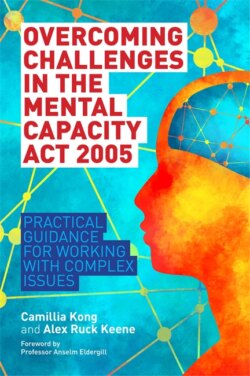Overcoming Challenges in the Mental Capacity Act 2005

Реклама. ООО «ЛитРес», ИНН: 7719571260.
Оглавление
Camillia Kong. Overcoming Challenges in the Mental Capacity Act 2005
Отрывок из книги
OVERCOMING
CHALLENGES
.....
The approach, however, does have rather puzzling implications. It appears to advocate that practitioners take individuals with impairments as isolated minds, removed from relationships and bodily interactions within their physical and social world. To use the tardiness example, this would be like my boss viewing my hypothetical decisions and actions as effectively causing my lateness (if I had left early enough, I would have been on time), to the exclusion of actual circumstances (like the bus not turning up on time, or being stuck in heavy traffic due to an accident, or my partner failing to fix my bicycle as promised, or the childminder cancelling last minute and the need to scramble for other arrangements). Despite the mundane nature of this example, even here divorcing our decisions and actions from actual circumstances can have serious consequences. If my boss doesn’t take into consideration any of these factors, she might actually decide that my tardiness is grounds for dismissal. But most of us are unlikely to think such an approach to be fair or appropriate or even commonsensical – the context matters. Likewise, and more pertinently, the context matters when we have to make decisions that affect our lives in profound ways, like who to marry, or where to live, or whether or not to have treatment for a life-threatening condition.
Importantly, we suggest that it is possible to take a different – broader – approach, while still remaining within the four walls of the MCA. We highlight here Re BKR [2015] SGCA 26, a case decided by the Singapore Court of Appeal. Singapore’s Mental Capacity Act 2008 (SMCA) is (materially for these purposes) an exact replica of that within England and Wales. In Re BKR, and for purposes of interpreting the relevant provisions of the SMCA, the Singapore Court of Appeal analysed the York decision in detail and held that evaluations of capacity would have little traction if the specifics of a person’s context and situation were removed from consideration. ‘[M]ental impairment may in some instances affect decision-making ability only in conjunction with P’s actual circumstances’, leading to the conclusion that ‘the court must take into account P’s circumstances in assessing his mental capacity’ (para. 120).8
.....